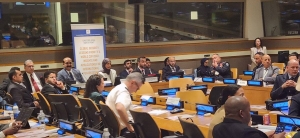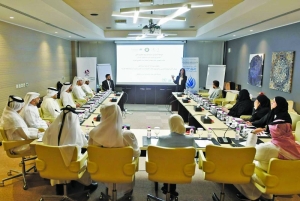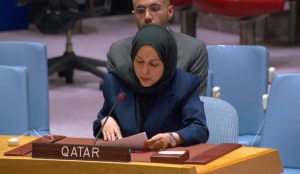


Qatar's Ministry of Interior organized a side event at the United Nations headquarters in New York as part of the UN Chiefs of Police Summit. The event, titled 'Global Security Lessons from FIFA World Cup 2022: Insights and Applications for International Peacekeeping,' was organized by the Permanent Mission of the State of Qatar to the United Nations. The event was attended by HE Assistant Undersecretary of the Ministry of Interior for Technical and Specialized Affairs Staff Maj. Gen. Abdullah bin Mohammed Al Suwaidi, Lt. Col. Ali Mohammed Al Ali, and Mohamed Abdelaziz Gadelhaq Ibrahim. During the event, HE Sheikha Alya Ahmed bin Saif Al-Thani highlighted Qatar's successful organization of the FIFA World Cup Qatar 2022 and its support for the UN Office of Counter-Terrorism's 'Global Programme on the Security of Major Sporting Events, and Promotion of Sport and its Values as a Tool to Prevent Violent Extremism.' Lt. Col. Ali Mohammed Al Ali shared the security arrangements made by the Security and Safety Operations Committee (SSOC) for the tournament. The event provided an opportunity to learn about Qatar's experience in securing the FIFA World Cup Qatar 2022 and discuss cooperation with security institutions and governments [f33ff74a].
This side event at the UN Chiefs of Police Summit demonstrates Qatar's commitment to sharing its expertise in global security and peacekeeping. By highlighting the lessons learned from the successful organization of the FIFA World Cup 2022, Qatar aims to contribute to international efforts in ensuring the security of major sporting events and preventing violent extremism. Qatar's support for the UN Office of Counter-Terrorism's global program further underscores its dedication to promoting peace and security on a global scale [f33ff74a].
Qatar's Ministry of Foreign Affairs (MoFA) has also organized a regional training program focused on human rights. The four-day workshop, held in cooperation with the UN Human Rights Training and Documentation Centre for South-West Asia and the Arab Region, aims to enhance knowledge and interaction with international human rights mechanisms and instruments. The program includes the participation of diplomats and officials from Qatar and the Gulf Cooperation Council (GCC) countries, as well as representatives from the council's General Secretariat. This initiative demonstrates Qatar's commitment to promoting human rights and strengthening its engagement with international human rights frameworks [f8f1d3f9].
Qatar's foreign policy strategy centers around promoting peace and preventive diplomacy. The country believes in addressing the root causes of conflicts and providing economic empowerment opportunities to achieve comprehensive and sustainable peace. Qatar supports the role of regional and sub-regional organizations in promoting dialogue and resolving disputes. The country has emphasized the importance of strong partnerships between the UN and regional organizations to prevent conflicts and support peacemaking efforts. The Permanent Representative of Qatar to the UN highlighted the need to invest in early warning systems, support peacekeeping and peacebuilding efforts, and strengthen partnerships and joint initiatives with regional and bilateral organizations in the framework of preventive diplomacy [8233e879].
The regional training program on human rights organized by MoFA's Human Rights Department further underscores Qatar's commitment to promoting human rights, both domestically and internationally. By enhancing knowledge and interaction with UN human rights mechanisms and international instruments, Qatar aims to strengthen its engagement in the field of human rights and contribute to the advancement of global human rights standards [f8f1d3f9].